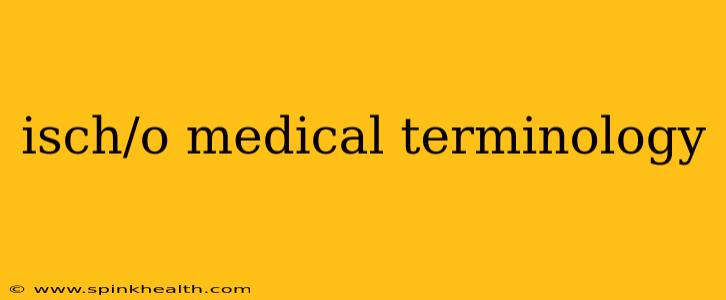Have you ever encountered the medical term "isch/o" and wondered about its meaning? This seemingly small prefix holds significant weight in the medical world, signifying a crucial concept: restriction or deficiency. Let's embark on a journey to understand its implications and explore its use in various medical contexts.
Imagine a bustling city where the flow of traffic suddenly grinds to a halt. A blockage, a restriction, has occurred. Similarly, "isch/o" describes a condition where the normal flow or function of something in the body is hampered. This "something" can vary significantly, leading to a wide range of medical terms and conditions.
What does isch/o mean in medical terms?
The root "isch/o" stems from the Greek word "ischein," meaning "to suppress" or "to hold back." This perfectly captures the essence of its medical application – a suppression or holding back of something vital, resulting in deficiency or restriction. It often relates to blood supply, but its applications are broader than that.
What are some medical terms that use the prefix isch/o?
Let's delve into some common medical terms incorporating "isch/o" and explore their meanings:
Ischemia:
This is arguably the most well-known term using the "isch/o" prefix. Ischemia signifies a restriction in blood supply to a body part, resulting in a deficiency of oxygen and nutrients. Imagine a vital organ, like the heart, struggling to function because the blood vessels supplying it are narrowed or blocked. This reduced blood flow is ischemia, and it can lead to serious complications if left untreated. The severity depends on the affected area and the duration of the ischemia. A heart attack, for example, is a severe form of ischemia affecting the heart muscle.
Ischemic Heart Disease:
This term directly relates to ischemia, specifically affecting the heart. Ischemic heart disease encompasses various conditions where blood flow to the heart muscle is reduced, often due to atherosclerosis (hardening and narrowing of the arteries). Angina (chest pain) and heart attacks are common manifestations of ischemic heart disease.
Ischemic Stroke:
A stroke is a serious medical event resulting from interrupted blood flow to the brain. An ischemic stroke, the most common type, occurs when a blood clot or other blockage prevents blood from reaching a part of the brain. This deprivation of oxygen and nutrients can lead to brain damage and neurological deficits. The speed and effectiveness of treatment are critical in minimizing the long-term impact of an ischemic stroke.
Frequently Asked Questions (FAQs) about Isch/o
Here are some common questions surrounding the "isch/o" prefix in medical terminology:
What are the symptoms of ischemia?
Symptoms of ischemia vary greatly depending on the affected organ or tissue. They can range from mild discomfort and pain to severe organ failure. For example, ischemia in the legs might cause pain during exercise (claudication), while ischemia in the heart can manifest as chest pain (angina). Brain ischemia may result in neurological symptoms like weakness, numbness, or speech difficulties. In general, symptoms related to ischemia can include pain, numbness, tingling, weakness, and changes in organ function.
How is ischemia diagnosed?
Diagnosing ischemia typically involves a combination of physical examination, medical history review, and imaging tests. These tests may include electrocardiograms (ECGs) for the heart, ultrasound for peripheral arteries, and magnetic resonance imaging (MRI) or computed tomography (CT) scans for the brain. Blood tests may also be used to evaluate organ function and detect markers associated with tissue damage.
What are the treatment options for ischemia?
Treatment for ischemia varies depending on the location and severity. It may involve lifestyle modifications like diet and exercise, medications to improve blood flow or reduce blood clots, angioplasty (opening blocked arteries), or bypass surgery. In the case of acute ischemia (sudden onset), immediate intervention is often crucial to prevent permanent damage.
Is ischemia a serious condition?
Yes, ischemia can be a very serious condition. Prolonged ischemia can lead to irreversible tissue damage and organ failure. Prompt diagnosis and treatment are vital to mitigate the potential for serious complications and improve the overall prognosis.
In conclusion, understanding the "isch/o" prefix is key to interpreting many important medical terms. It represents a crucial concept—restriction or deficiency—often related to blood flow and its consequences on the body's tissues and organs. This knowledge empowers us to better grasp the intricacies of medical diagnoses and treatments. Remember, this information is for educational purposes and should not replace professional medical advice. Always consult a healthcare provider for any health concerns.

